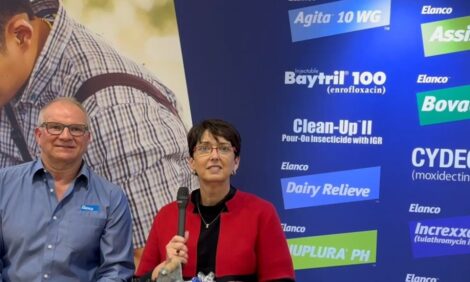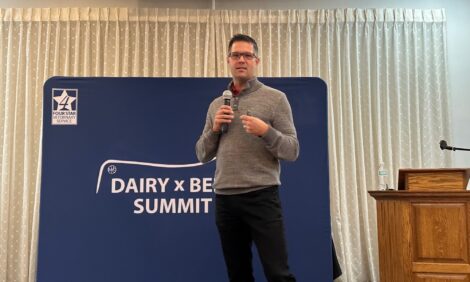



Food Security in a Transparent World
NETHERLANDS - Delegates at a recent conference on how to achieve worldwide food security heard about sustainability initiatives from global fast-food company McDonald's and a meat company sourcing its beef from a particularly environmentally sensitive area, reports Jackie Linden for 5m Publishing.The Nutreco AgriVision 2015 conference, held recently at Noordwijk aan Zee in the Netherlands, offered some interesting insights into successful sustainability initiatives by some of the world’s leading food companies.
Animal Health and Welfare at McDonald’s: Balancing Global and Local
McDonald’s has a global presence yet it depends on local supply chains, presenting it with particular challenges, according to Bruce Feinberg, Global Animal Health and Welfare Officer for McDonald’s Corporation. The company has over 35,000 restaurants in more than 100 countries serving 70 million customers daily.
Since 1955, it has followed its commitment to supply safe, quality and affordable food and Mr Feinberg said: “Everything we do begins and ends with our customers.”
Among the company’s challenges are that while it sees its supply chain as a series of individual, integrated segments, customers see each step as part of the McDonald’s brand.
Consumers link healthy animals to safe food. In a recent survey in several countries, customers ranked of the humane treatment of animals and minimum use of antibiotics and hormones as their most pressing concerns.
While the McDonald’s baseline standards are set globally, sourcing is local. The company sees its role to strike the right balance; “Science tells us if we can and consumers tell us if we should,” as Mr Feinberg said, adding “It’s all about trust.”
For example, he explained, in 2003, McDonald’s formed its first policy on the use of antibiotics internally. It called for veterinary supervision without any specification regarding growth promotion, required ‘sustainable use’ and only covered poultry.
By 2014, antibiotic use in farm animals had become such an important issue for its customers that McDonald’s set up its Vision for Antimicrobial Stewardship (VAS), involving external consultants. Published earlier this year, VAS recognises the issue of antibiotic resistance and prohibits use of six critical antimicrobials. Veterinary supervision has been raised to meet internationally accepted standards, antibiotics for growth promotion are banned and it has been extended to cover beef, pork, eggs and dairy as well as poultry meat.
Instead of specifying the sustainable use of antimicrobials by its suppliers, VAS stipulates judicious use, which McDonald’s defines as “Less is more but zero is not an option”. Treating sick animals is still critically important, Mr Feinberg stressed.
Turning to the company’s commitment to sustainability, McDonald’s is a founder member of the Global Roundtable for Sustainable Beef, a global, multi-stakeholder initiative developed to advance continuous improvement in sustainability of the global beef value chain through leadership, science and multi-stakeholder engagement and collaboration.
Partnering with Suppliers for Safe and Sustainable Foods
Marfrig is a Brazil-based global meat company, covering the chicken, beef and lamb sectors through retail and food service channels.
Focusing on its beef business, Mathias Almeida, Head of Sustainability at Marfrig Global Foods, explained that the company’s challenges include producing more with less, conservation of natural resources, aiming for the highest possible standards of food safety, traceability from farm to fork and developing sustainability within the supply chain.
He explained that Brazil has the resources to produce high-quality beef efficiently, without the need for further deforestation of the Amazon region. Cattle can be raised on the marginal land, while the crops such as soybeans are grown on the better arable land. It is not the beef ranchers who have cut down the trees, he stressed, but land speculators exporting the timber.
Accepting that deforestation in the Amazon is a big issue for consumers, Marfrig has developed a number of initiatives with various partners to demonstrate the environmental credentials of its ranchers. These cover greenhouse gas emissions, sustainable beef and soya production and rainforest preservation.
Following accusation of its involvement in deforestation in 2009, Marfrig formed an agreement with the NGO, Greenpeace, which involved monitoring in the Amazon region. Using satellite mapping and closely questioning its rancher suppliers, Marfrig undertook to source its beef only from those who meet the required standards, the most important of which is that they have undertaken no deforestation since 2009.
Of the more than 8,300 farms and 26 million hectares monitored by Marfrig in the states of Mattogrosso, Rondônia and Paranà, 6,471 (77 per cent) were found to comply fully. Mr Almeida added that growth-promoting hormones are not allowed in Brazil and antibiotics may not be used preventatively but only to treat any sick animals. Over 90 per cent of the beef is grass-fed.
And for all these assurances, no price premium is requested by Marfrig – but rather a commitment by its customers to long-term business agreements so that Amazon ranchers can be rewarded for helping to conserve this vital region.
Mr Almeida explained that his company has also engaged in the value chain in a partnership with The Nature Conservancy and Walmart in a ‘farm to fork’ initiative. Cattle producers benefit from sharing knowledge, while Marfrig monitors the supply chain, TNC is able to field-test new sustainability initiatives and Walmart takes care of sales and the all-important communication to the end-consumer.
Value chain engagement is vital, according to Mr Almeida, who said that even for a big player like Marfrig, “We can’t do this alone.”



